News & Announcements
- Details
- Written by Joshua Wachtel
Natalie Medina, an actor who also teaches theater to youth in Panama with Fundación Amaneceres, discusses why kids like the combination of theater and circles, the importance of the talking piece and a play young refugees developed inspired during a circle discussion.
- Details
- Written by Joshua Wachtel
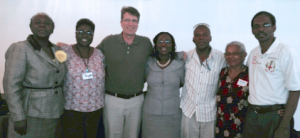 IIRP Trainer Lee Rush during a Training of Trainers in Jamaica. Slain peace worker Mohan Bunwarrie is second from Rush's left.“My goal is to make Jamaica a restorative country,” said Carol Palmer, Permanent Secretary of the Jamaican Ministry of Justice. “I know this vision is grand and beyond one generation. But I believe we can do something to change the fact that too many Jamaicans do not know how to settle differences and disputes peacefully, and instead perpetuate violence amongst each other and our communities.”
IIRP Trainer Lee Rush during a Training of Trainers in Jamaica. Slain peace worker Mohan Bunwarrie is second from Rush's left.“My goal is to make Jamaica a restorative country,” said Carol Palmer, Permanent Secretary of the Jamaican Ministry of Justice. “I know this vision is grand and beyond one generation. But I believe we can do something to change the fact that too many Jamaicans do not know how to settle differences and disputes peacefully, and instead perpetuate violence amongst each other and our communities.”
Last year, Jamaica, as a key component of implementing its National Restorative Justice Policy, opened seven Community Restorative Justice Centers working officially in 11 communities. In their first phase of implementation, these centers have begun to address community conflicts and complaints outside the formal justice system.
- Details
- Written by Joshua Wachtel
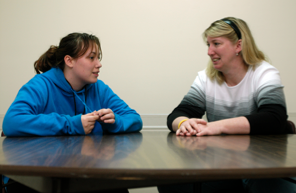 When teenagers turn to drugs and alcohol in ways that damage their lives and relationships, it’s challenging to help them turn their lives around. The choice to use alcohol and drugs can mask other underlying issues, including shame and other painful emotions, and can be exacerbated by the difficulties of communication. This article explores how everyday language can be used within a restorative framework to help parents of teens struggling with drug abuse and addiction to reintegrate in a healthy way with their families, schools, friends and communities.
When teenagers turn to drugs and alcohol in ways that damage their lives and relationships, it’s challenging to help them turn their lives around. The choice to use alcohol and drugs can mask other underlying issues, including shame and other painful emotions, and can be exacerbated by the difficulties of communication. This article explores how everyday language can be used within a restorative framework to help parents of teens struggling with drug abuse and addiction to reintegrate in a healthy way with their families, schools, friends and communities.
Drug and alcohol counselor Elizabeth Smull, who has worked primarily with teens struggling with addiction and their families, uses the full range of restorative practices on a daily basis, especially many of the more informal practices, such as affective statements and questions. Beyond using these techniques, Smull actively teaches those she works with how to use these techniques themselves. This begins immediately after a teen has returned home from a drug and alcohol rehabilitation program or has been court-ordered to a period of juvenile probation.
- Details
- Written by Joshua Wachtel
Schools
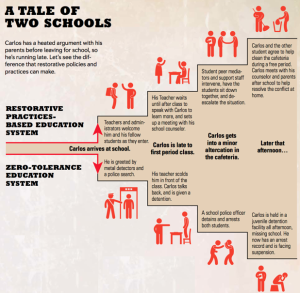 A major report by the Council of State Governments, in support of the US Justice and Education Departments' national school discipline guidelines, shows that the consensus on school discipline "among students, parents, teachers, school administrators, specialized staff, behavioral health professionals, police, probation, court officials, juvenile correctional administrators, and many other expert advisors" includes restorative practices as a core feature. (See p. 4 of the report or 29 of 461 in the pdf.)
A major report by the Council of State Governments, in support of the US Justice and Education Departments' national school discipline guidelines, shows that the consensus on school discipline "among students, parents, teachers, school administrators, specialized staff, behavioral health professionals, police, probation, court officials, juvenile correctional administrators, and many other expert advisors" includes restorative practices as a core feature. (See p. 4 of the report or 29 of 461 in the pdf.)
The National Education Association supports "Sowing Empathy and Justice in Schools Through Restorative Practices."
Educational Leadership publishes "The Power of the Circle" by the IIRP's Laura Mirsky, about the great work being done at Harding Middle School in Philadelphia, PA.
- Details
- Written by IIRP Staff
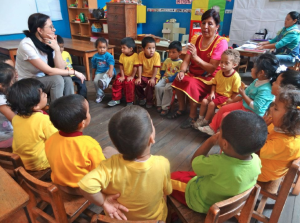 El Instituto Latino Americano de Prácticas Restaurativas (ILAPR), afiliado al IIRP, con sede en Lima, Perú, ha venido trabajando durante tres años para promover el desarrollo de las prácticas restaurativas en todo Sudamérica y México. Jean Schmitz, director del ILAPR, y sus colegas, han proporcionado capacitación básica en prácticas restaurativas a aproximadamente 1,000 personas en siete países, incluyendo a Perú, Brasil, México, Argentina, Bolivia, Ecuador y Colombia. Este desarrollo profesional está comenzando a tener un impacto en los campos de la educación y la justicia penal.
El Instituto Latino Americano de Prácticas Restaurativas (ILAPR), afiliado al IIRP, con sede en Lima, Perú, ha venido trabajando durante tres años para promover el desarrollo de las prácticas restaurativas en todo Sudamérica y México. Jean Schmitz, director del ILAPR, y sus colegas, han proporcionado capacitación básica en prácticas restaurativas a aproximadamente 1,000 personas en siete países, incluyendo a Perú, Brasil, México, Argentina, Bolivia, Ecuador y Colombia. Este desarrollo profesional está comenzando a tener un impacto en los campos de la educación y la justicia penal.
- Details
- Written by Joshua Wachtel
 “Usually teachers do too much talking,” said Mike Selvenis, principal of Thomas W. Holtzman Elementary School. “Restorative practices give teachers a way to get out of the way of students. Circles help make the classroom a comfortable place to get conversation going.”
“Usually teachers do too much talking,” said Mike Selvenis, principal of Thomas W. Holtzman Elementary School. “Restorative practices give teachers a way to get out of the way of students. Circles help make the classroom a comfortable place to get conversation going.”
Selvenis has committed Holtzman Elementary, which serves grades three to five and is located on the outskirts of Harrisburg, Pennsylvania, USA, to school-wide restorative practices implementation. “From what I have seen,” he said, “the strongest implication is for the classroom. I see teachers utilizing circles for instruction and actually working on academics. Teachers are using circles to share information and have students report out from groups, talk about their beliefs and argue their points of view. ”
- Details
- Written by Joshua Wachtel
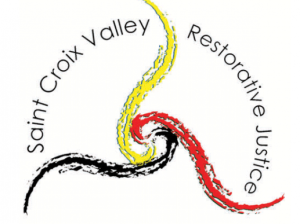
St. Croix Valley Restorative Justice Program (SCVRJP), based in River Falls, Wisconsin, USA, has developed a unique practice for working with young adults who have been arrested for crimes such as underage drinking, possession of drugs and paraphernalia, disorderly conduct and teen driving offenses. Using a restorative circle process, SCVRJP brings together offenders referred by the local courts, universities and high schools, who meet together with previous offenders and other community volunteers who have been impacted by these issues. A volunteer circle-keeper facilitates a focused discussion to present information to participants and to share a variety of perspectives.
The process builds upon victim impact panels (VIP), a process in which victims and family of drunk driving accidents tell their stories to those caught drinking and driving. Often VIPs take place in a hall full of participants, with the victims telling their stories from a podium or stage. Kris Miner, director of SCVRJP since 2004, wanted to make the experience more intimate and meaningful. “We continued to call them panels at first,” she said, “but actually we ran them as restorative justice circles.”
- Details
- Written by Joshua Wachtel
 The Latin American Institute of Restorative Practices (El Instituto Latino Americano de Prácticas Restaurativas or ILAPR), IIRP’s affiliate based in Lima, Peru, has been working for three years to foster the development of restorative practices throughout South America and in Mexico. Jean Schmitz, director of ILAPR, and his colleagues, have provided basic restorative practices training to approximately 1,000 people in seven countries, including Peru, Brazil, Mexico, Argentina, Bolivia, Ecuador and Columbia. This professional development is beginning to have an impact in the fields of education and criminal justice.
The Latin American Institute of Restorative Practices (El Instituto Latino Americano de Prácticas Restaurativas or ILAPR), IIRP’s affiliate based in Lima, Peru, has been working for three years to foster the development of restorative practices throughout South America and in Mexico. Jean Schmitz, director of ILAPR, and his colleagues, have provided basic restorative practices training to approximately 1,000 people in seven countries, including Peru, Brazil, Mexico, Argentina, Bolivia, Ecuador and Columbia. This professional development is beginning to have an impact in the fields of education and criminal justice.
In Lima, the capital of Peru, Schmitz trained a team of 30 professionals who work with adult and youth offenders in non-punitive alternative justice programs, such as those that assign community service work. Prior to the training, said Schmitz, the professionals were interested in only one thing: whether the offenders were completing their required service. Now, with restorative practices as a theoretical and practical foundation, the professionals have begun to employ circles with the offenders. In addition to the community service work, they give offenders a chance to talk to one another using a circle format, reflecting on their actions and discussing how they might repair the harm they’ve caused. During one circle Schmitz attended, he was impressed by one of the offenders, who talked about how important it was for him to learn about the experience of others in the group. The offender said he is more conscious of his own actions now. He said he believes he has righted his wrongs and no longer owes a debt to those he harmed.
- Details
- Written by Joshua Wachtel
In this short video segment, Les Davey, chief executive of IIRP Europe, discusses work his organization has done in Ireland with victims of sexual abuse by clergy. Sexual abuse cases require careful handling, but they can be powerful experiences, especially for victims. In this video Davey describes one example of the positive effects a conference had for a victim of abuse, who was finally able to sleep well after the restorative meeting. Davey has recently been approached to run a restorative conference for a child in England who was abused in her home at a young age by an ex-boyfriend of her mother.
Watch the short video, "Restorative responses to sexual abuse by clergy," at youtube.
- Details
- Written by Joshua Wachtel
Schools
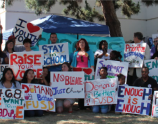 • California’s Fix School Discipline, a project of Public Counsel, encourages schools in California to address school climate in their newly required Local Control Accountability Plans (LCAP). In a recent blog post counting down to the July 1 deadline, they praise Fresno schools:
• California’s Fix School Discipline, a project of Public Counsel, encourages schools in California to address school climate in their newly required Local Control Accountability Plans (LCAP). In a recent blog post counting down to the July 1 deadline, they praise Fresno schools:
Restorative Practices, the critical alternative to suspension in Fresno, is used to build a sense of school community and resolve conflict by repairing harm and restoring positive relationships through the use of regular ‘restorative circles’ where students and educators work together to set academic goals, develop core values for the classroom community and resolve conflicts.

Restorative Works Year in Review 2024 (PDF)
All our donors are acknowledged annually in Restorative Works.
